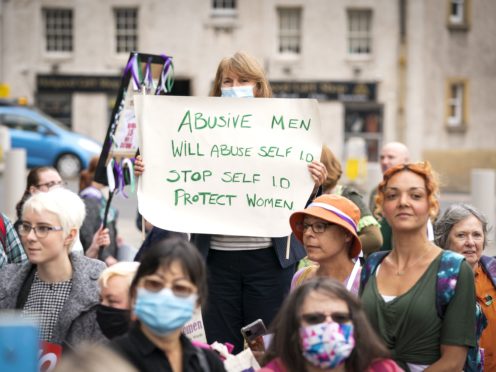The Scottish Government is pushing ahead with controversial plans to reform the legal process which allows people to change their gender.
The move comes after consultation on the planned changes found a “small majority” of organisations who responded were broadly in favour.
The consultation responses were published by ministers at the same time as women’s groups opposed to reforms demonstrated outside Holyrood on Thursday.
The draft Gender Recognition Bill plans to reduce to six months the time it takes for transgender people to get a certificate recognising their gender.
Applicants would first have to live as their acquired gender for a minimum of three months before seeking a gender recognition certificate, with a further three-month period of “reflection” being required before this can be confirmed.
The reforms also seek to reduce the age at which someone can apply for a gender recognition certificate from 18 to 16.
Ministers had shelved the legislation last year in the wake of the coronavirus pandemic.
Social Justice Secretary Shona Robison confirmed work on the draft Bill has now resumed, with details to be included in Nicola Sturgeon’s Programme for Government next week.
Ms Robison said: “The Scottish Government is committed to making necessary changes to the Gender Recognition Act to improve and simplify the process by which a trans person can obtain legal recognition.”
She stressed this will be done “whilst ensuring we uphold the rights or protections that women and girls currently have under the Equality Act”.
More than 17,000 individuals and organisations from Scotland, the rest of the UK and all over the world gave their views in the consultation.
An analysis of responses “suggests that a small majority of organisations broadly supported changing to a statutory declaration-based system”, as proposed by the Scottish Government.
Groups backing the reforms included the “considerable majority” of organisations representing children and young people, as well as LGBT groups, trade unions, local authorities and third sector bodies.
However the report acknowledged that “around four in 10 organisations did not support” the changes, and about one in 10 either did not have a view or did not make it clear.
Those who are opposed are “very concerned about the potential impact of the proposed changes on society in general, but on the safety and wellbeing of women and girls in particular”, the analysis found.
This was the perspective of “many individual respondents and the considerable majority of the women’s groups and religious or belief bodies that responded”, it added.
Such responses raised “specific concerns” about transgender females in women’s prisons, as well as issues surrounding access to changing rooms, public toilets and women’s refuges.
Some who responded warned “victims of male violence may feel threatened by the presence of male-bodied people, even if those concerned mean no harm”.
Overall a majority of those who responded (56%) agreed that the age at which a person can apply for a gender recognition certificate should be reduced from 18 to 16, with 42% opposed to this while 2% did not know.
When only respondents from Scotland were considered, 49% supported such a change, with the same number against and 3% who said they did not know.
Progress on gender recognition reform was included in the powersharing deal recently agreed between the Scottish Government and the Greens.
Scottish Greens equalities spokeswoman Maggie Chapman said: “Trans people are one of the most marginalised and victimised groups in Scottish society and the Scottish Greens are committed to protecting and further their right to exist and be free from demonisation and abuse.
“Now that the consultation responses report has been published, we look forward to progressing this overdue reform in Parliament, as outlined in the co-operation agreement between the Scottish Greens and the Scottish Government.”
